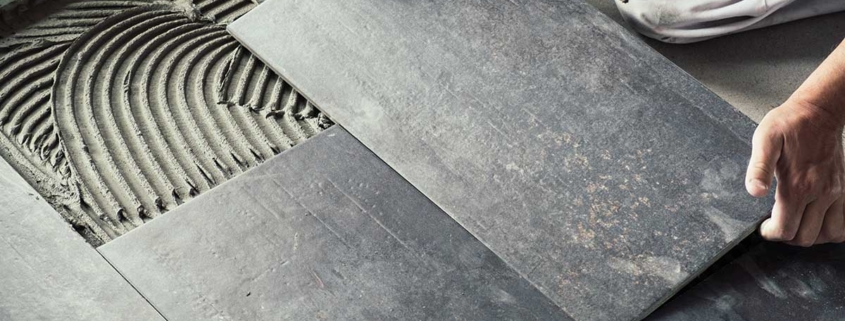Floor Tiles are What People Notice First
Although often neglected, your floor is the first thing people notice when they come into your home. There are several types of floor tiles, and each has its features and properties.
Types of Floor Tiles
Before selecting the design or color, you need to explore the various features and properties of each of the types of tiles and make sure the one you choose is appropriate for the area or room you intend to use it. There are so many types of tiles … spectacular and inspiring colors and patterns. There are so many options, price points, and types. Here are the pros and cons of the most common floor tiles on the market today.
Vinyl Flooring
Vinyl flooring has some advantages over other flooring, including a lower price tag. It is generally much less expensive than hardwood and it performs better in areas where moisture is a concern. Luxury Vinyl Flooring (LVF) is often chosen for bathrooms, kitchens, entryways, basements and is pet friendly. It is available in luxurious designs and wood tones and is often indistinguishable from wood flooring, ceramic, or porcelain tile.
Vinyl tiles come in a wide range of styles and quality. Keep in mind that product thickness various so be sure to compare overall thickness of each product you are considering. The surface “wear layer” should always be the thickest … at least 5mm. The more durable vinyl has an inlaid design that extends down into the thickness of the vinyl, rather than just having a printed design layer. While more expensive, this feature means a more long-lasting product.
If you worry about the floor being slippery, look for a tile that has a texture that gives a bit of grip underfoot. There are several types of backings that impact the way the tile is installed. Some are self-adhesive; some have a cushioned backing, which can be quieter and more insulating.
Ceramic Tile
Manufactured with a mix of clay, water, and minerals, ceramic tiles are fired at high temperatures. Glazed styles are treated with a liquid glass coating and are fired a second time to create a hard, stain- and scratch-resistant finish. Ceramic tile is affordable (about $2 to $7 per sq.ft.), comes in a vast array of colors and designs, and is durable.
Colors can vary from lot to lot, so be sure all your tiles come from the same lot number. Ceramic is not ideal for high-impact areas and handmade tiles can be expensive.
Porcelain Floor Tiles
Porcelain is a type of ceramic tile that is fired at an even higher temperature than ceramic tiles, making it denser and less porous. Porcelain tiles can be used on walls and backsplashes, as well as on floors. It is easy to clean and comes in a variety of styles and colors. It can be purchased for $3 to $7 per sq. ft.
Porcelain tiles require a special setting material that is designed to adhere to non-porous materials.
Glass Tiles
Not generally used for floors, glass tiles are made from thin pieces of glass sold individually or as a mosaic on a mesh backing. Prices vary widely from $7 to $30 or more per sq. ft. Colorful and reflective, glass tiles are easy to clean. Best for walls and backsplashes, glass tiles are sometimes used for flooring.
The tiles can be expensive and difficult to install and since the tiles are transparent, the adhesive may be visible through the tiles.
Natural Stone Floor Tiles
Priced between $6 and $15 per sq. ft, natural stone tiles include granite, slate, travertine, marble, onyx, sandstone, and more. The natural stone is cut into thin, regular pieces to achieve a rich, one-of-a-kind look.
While natural stone is easy to clean, it requires extra maintenance since most stone tiles can be damaged by exposure to pigment, water, or acid. Natural stone should be sealed upon installation and resealed every ten years.
Cement Tiles
Handmade of natural materials, cement tiles (also known as encaustic or Cuban tiles in the United States, have bold patterns and are resilient and beautiful. They are appropriate for floors, walls, and backsplashes and typically range from $9 to $17 per sq.ft.
Cement tiles are not as common as other floor tiles so your installer may not be experienced with them. Cement tiles are prone to etching by acid or harsh detergents, so care must be taken when cleaning them. They must be sealed upon installation and resealed occasionally.
One More Thing about Floor Tiles…
You should know the difference between Calibrated Tile and Rectified Tile. These are terms you may hear when selecting your tile and they refer to the finished trim on the tiles.
Calibrated tile is cut before it is baked. The tile is cut in consistent squares and is then put into the oven. Because tile shrinks at different rates – not substantially – but enough to potentially cause issues about grout lines and symmetry or problems with tiles not fitting flush with each other when grout lines are minimized.
Rectified tile is pre-cut, baked, and then trimmed. This process minimizes size variations from tile to tile. Rectified tile is not considered “better” than calibrated. It is simply different. Rectification can produce beautiful, unique effects, but extra care must be taken to prepare the floor to achieve the expected results.
Do a bit of research before you select your floor tiles. Consider the conditions of where you intend to install the tile, and be sure to consult a professional to install whatever tile you choose so your result is as beautiful as you imagine and desire.
If you are thinking about new flooring for your home, call us at 508-918-0422 at A.W. Puma Remodeling and Restoration, or visit our contact page. We begin with a consultation to hear your vision. We will explain our process and answer all your questions. Together we will design and create a new living space that you and your family will love and enjoy for many years!





